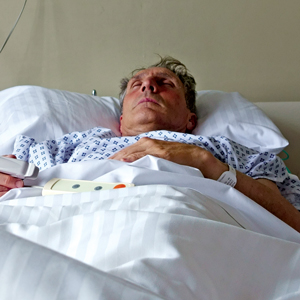
Many nursing home residents with advanced dementia, especially men, receive burdensome interventions and antibiotics in their final days of life, according to a study published August 16 in JAMA Network Online. The findings point to the need for sex-specific analysis in dementia research and expanded palliative care, researchers say.
The study analyzed 27, 243 male and female nursing home residents age 66 or older who had advanced dementia and died between June 11, 2010, and March 31, 2015. Although participants of both sexes experienced burdensome interventions within their last month of life — including being transferred to acute care facilities, being subjected to mechanical ventilation, and receiving antibiotics – men were more greatly affected. Nearly 29% (28.9%) of male residents were admitted to a hospital, compared to 18.9% of female residents, and 18.1% of men died in an acute care facility compared to 11.8% of women. Mechanical ventilation was administered in 1.2% of men versus 0.6% of women.
Many of the 9,844 male and female residents who had a Resident Assessment Instrument Minimum Data Set, version 2.0, completed in their final month of life were physically restrained (28.3% of women and 30.4% of men). More than a third of all residents studied were given an antibiotic, although men saw the highest prescribing at 41.4% versus 34.1% for women.
“Only a minority of residents saw a palliative care physician in the year before death, but those who did were significantly less likely to experience an end-of-life transition of care and to receive antibiotics,” the researchers noted in the study.
The new JAMA Network Online study aligns with other findings that state advanced dementia should be considered a terminal disease that warrants palliative care with symptomatic interventions only.




